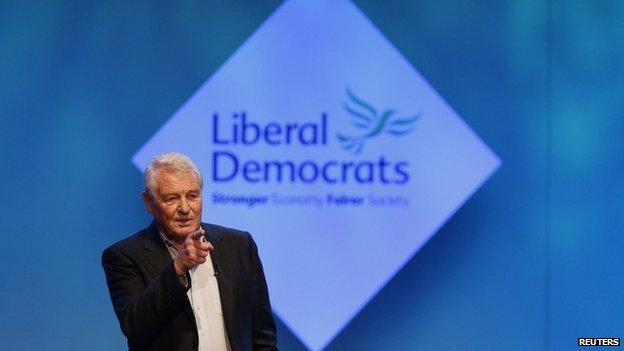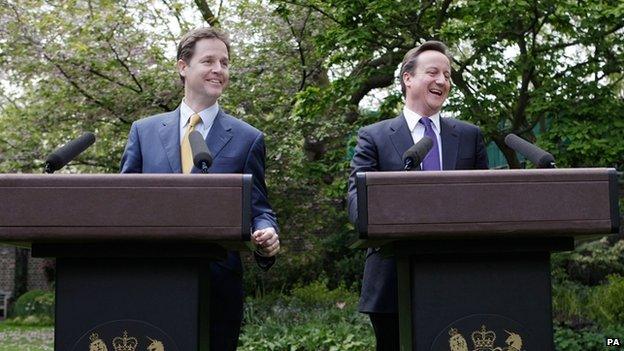Lib Dems seek centre 'gap' as Tories and Labour shift
- Published
Mr Clegg urged his party to fight "tooth and nail" to prevent a Conservative or Labour government
Political parties claim their annual conferences are a shop window to the wider world.
They speak to the country, so the jargon goes, and not to the hall.
And yet this autumn, as the months creep closer to the coming election in May, the three largest parties have focused their minds, their policies and their speeches on their core members and supporters.
Ed Miliband sought to energise reluctant Labour voters with more money for the NHS.
David Cameron tickled Tory fancies with the promise of tax cuts.
And here in Glasgow Nick Clegg and his fellow Liberal Democrats are trying to breathe life in their ailing party by bashing the Conservatives.
The Lib Dem leader has accused the Tories of "beating up on the poor".
The Chief Secretary to the Treasury, Danny Alexander, said the Tories would "take an axe to your local school".
Lord Ashdown said the Tories "screw the weak".
So far, so electoral.

Lord Ashdown was one of several senior Lib Dems to attack the Conservatives
The Lib Dems lost many votes for forming a coalition with the Conservatives.
They want to win some back by reasserting their political identity and differentiating themselves from their coalition partners.
So Tory bashing, they hope, will appeal to former Lib Dem supporters who defected to Labour, and to Lib Dem supporters who remained loyal but are disillusioned with coalition and austerity.
The party also hopes to peel off a few soft Conservatives who might be unhappy with David Cameron's welfare cuts and his declaration of war against the European Court of Human Rights.
The blunt anti-Tory language is also no accident.
The Lib Dems know they have to get heard before they can be believed.
And right now few voters appear willing to do either.

The Lib Dems hope to win back support they have lost since going into coalition with the Conservatives
So being rude about their fellow ministers, they hope, might break through the noise.
And once they get a hearing, their pitch is that the Lib Dems would fix the economy more fairly than the Tories.
The Lib Dems would eliminate the deficit, they say, not just by cutting spending as the Tories promise, but also by raising taxes on the rich.
On Sunday Mr Alexander was clear he still wanted to levy a so-called mansion tax by introducing more council tax bands for higher-value properties.
And the Pensions Minister Steve Webb made it very clear he wanted to go much further in cutting pension tax relief for the better off.
Red line?
At the same time Nick Clegg was very clear in an interview with the BBC's Andrew Marr that he would not accept Conservative plans to freeze working-age benefits for two years without taxing the rich too.
"The Lib Dems are not going to enter into government with an economic agenda which the Conservatives have announced is their priority which would only penalise the working-age poor," he said.
"It is anathema to everything we believe in."
Party sources insisted this was not a red line for potential future coalition negotiations, but if it is not a red line, I am not sure what is.
Nick Clegg MP on Syria, IS and UK party politics
There are risks with all this Tory bashing.
It makes it much harder for the party to pursue its other strategic aim, namely getting some credit for its achievements in government.
If you want to tell voters what a good coalition partner you have been with the Conservatives, how you have become a party of government and not a party of protest, how you have altruistically joined forces with the Conservatives to save the nation from economic ruin, how together you have agreed to cut taxes for the low paid while also paying down the deficit, it is hard to condemn those self-same Tories in the same breath.
And if you argue, as Mr Clegg did earlier, that the Lib Dems "have restrained the Conservatives from doing what they want on penalising the poor, on ignoring the environment, on trashing our civil liberties and human rights", then it can also become harder to claim more positive credit for joint endeavour.
Gap in market
The risk is that voters do not clock the difference between agreeing on current coalition policy and disagreeing about the future.
The risk is that some voters consider the Lib Dems to be hypocritical for criticising a party they have been in coalition with for the last four years.
And the risk with all the fruity language of condemnation is that passion becomes peevishness.
And repeated attempts to claim credit for government achievement can begin to look needy.
And neither characteristic is attractive to voters.
So the Lib Dem strategy is clear: to exploit what they see as a gap in the political market as Labour shifts left and the Tories move right.
And that necessarily involves criticising their coalition partners.
But they also want to leave the door open to coalition with either party.
I asked one Lib Dem MP if he detected a ritual feel to some of the anti-Tory rhetoric and he just smiled.